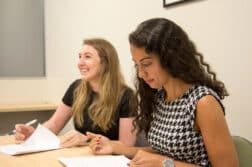Why did Stephen Poquiz leave Canada and travel 14,000 km to Sydney, Australia, to study law?
“I knew that I wanted to study at a university that was internationally and locally renowned. This is why I picked the Juris Doctor, a three-year program for mature students, at the University of New South Wales.”
Stephen spent two and a half years studying at UNSW in Sydney and now works for a distinguished law firm in downtown Toronto. He credits his experience in Australia with giving him a more well-rounded résumé and international mindset.
Australia is home to many inventions and scientific breakthroughs including:
- Cervical cancer vaccine, Gardasil
- The nanopatch to deliver vaccines without needles
- The bionic ear
- Google maps
- Gi-Fi – gigabit wireless (known as radar on chip)
- The 802.11 technology behind Wi-Fi
- Spray-on-skin
- Black box flight recorder
“The benefits of studying in Australia were immense. The opportunity to submerge myself in Australian culture has forever changed my outlook on the world from a personal and professional perspective. My experience allowed me to witness the impact of globalization and see firsthand how intertwined commerce and business are all over the world.”
Inspired? Just as Stephen did, you too can have an enlightening study abroad experience and greatly benefit from an Australian education.
Wondering why you should study in Australia?
- Australia has an international reputation for excellent education and training, and is recognized as a world leader in biomedicine, environmental science, astronomy, nanotechnology, water resource management, and Asia Pacific studies.
- Australia’s research strengths are globally renowned – with only 0.3% of the world’s population, Australia produces 3% of the world’s scientific papers.
- Five of Australia’s universities feature in the Top 100 ranked universities in the world in the Shanghai Jiao Tong Academic Ranking of World Universities 2013. Six Australian universities are in the Top 100 of the Times Higher Education World University Rankings 2012/13.
- Australian universities also appear in the top 50 institutions worldwide across the study areas of arts and humanities, clinical, pre-clinical and health, engineering and technology, life sciences, physical sciences, and social sciences.
- With expertise in Asia-Pacific languages, cultures and diplomacy, Australia offers exposure to this dynamic region in an English-speaking environment.
- As a major destination for international students, you will find Australia to be welcoming, diverse, and cosmopolitan. In surveys of best student cities in the world, Australian cities top the rankings in terms of quality of living, employer activity, and student mix.
- Australia offers post-study work opportunities to international students with Australian degrees. Stay in Australia up to two years to gain international work experience and build your career.
- Australia offers a flexible academic calendar—start dates in February or July—and an independent learning experience that puts you at the centre of learning.
More than 4,200 Canadian students choose to study in Australia each year. Most are pursuing bachelor’s and master’s degrees in medicine, pharmacy, dentistry, law, business and management, and veterinary medicine.
Australia’s 42 universities offer a comprehensive range of majors, but Australia is particularly known for its strengths in the sciences including life sciences, material sciences, engineering, information technology, clean energy, and the environment.
Five Steps
to Apply
- Find a program/university
- Submit the application form for admission
- Receive an offer
- Accept offer, pay tuition and overseas student health cover
- Apply for your visa using the Confirmation of Enrolment
How to apply
First of all, select a program of study or major at the universities you are interested in. Not sure which universities offer your major? Use the course search on the Study in Australia website to find out which universities offer your major.
Still not sure where to apply? You might want to consider location, size of university, teaching and lab facilities, housing, as well as factors such as employability rates of graduates. The Australian Government’s ‘My University’ online comparison tool can also help you decide on which universities to apply to.
Once you’ve decided on the university, contact them to ensure you meet entry requirements. Application forms can usually be downloaded from university websites. Generally speaking, there are rolling admissions for international students, except in professional degree programs such as medicine, where specific application deadlines must be met.
Canadian students should apply no later than four months before the start of the semester. And in keep in mind that Australia is in the Southern Hemisphere so the academic year is flipped. Semester one begins in February/ March and semester two in July/August. Some universities run a trimester system, so be sure to check with your chosen university about its start and end dates.
Once you’ve completed your application for admission and submitted the required information, you will receive a letter informing you if you’ve been accepted. Should you accept the offer and pay the required tuition fees and overseas student health coverage, your university will issue you with a Confirmation of Enrolment. You will need this document to apply for your student visa, which you can do online at www.immi.gov.au.
Entry requirements for Canadian students
Entry requirements vary across Australian universities and program to program. Generally speaking, a Canadian high school student will need a high school diploma with grades of least 70% or higher in final year of classes. Quebec students must have completed at least 12 academic credits, including English.
Students applying to Australian master’s degree programs will generally need a four-year-bachelor’s degree (honours) with a minimum GPA of ‘B’ or equivalent work and study experience.
About Australia
- The sixth largest country in the world (about the same size as continental US).
- A multicultural population of 23 million (1 in 4 Australians were born outside of the country).
- A land of diverse climates with spectacular scenery (with 10 per cent of the world’s biodiversity – many of its native plants, animals and birds exist nowhere else in the world).
- The world’s 12th largest economy and one of the most stable in light of the recent global financial crisis.
- Canberra is the nation’s capital, with Sydney and Melbourne being the largest cities respectively.
Sources: www.australia.gov.au and www.dfat.gov.au
How to pay for your Australian degree
Each university sets its own tuition fees, but the typical range for a bachelor’s degree is A$15,000 to $33,000 and for a master’s degree A$20,000 to $37,000. (Note: current exchange rate approximately at par.)
You might be thinking, how will you pay for you Australian degree? Canadian students generally use a range of sources including personal savings, Canada Student Loans, scholarships and grants. The Study in Australia website lists all of the available scholarships.
Your student visa will enable you to work part-time during the academic year and full-time during breaks, which can assist with paying for living costs, travel and other expenses. With a low unemployment rate and high minimum wage, there are lots of opportunities to work while you study.
Student support
The Australian Government works in partnership with Australian education providers to ensure that international students can enjoy a safe, welcoming environment.
All Australian education institutions that enrol international students must be registered with the Australian Government and meet high standards of quality and ethical practice. These standards relate to curriculum, qualifications of teaching staff, facilities and specialist equipment. Students can therefore be confident that they will receive the quality of education that they pay for.
Rigorous steps are also taken by all education institutions to provide comprehensive student support. Specialist services to help international students adjust to life and study in Australia and to achieve their goals include:
- language tuition where required
- designated international student advisers
- on-arrival reception and orientation programs
- health, counselling, accommodation and career and employment services.
Where to go for
more information
- The official Australian Government website for international students, with information on courses, institutions and scholarships, studying and living in Australia and student stories iswww.studyinaustralia.gov.au
- English language training: www.elicos.edu.au
- Austrade, 175 Bloor Street East, Suite 1100, South Tower, Toronto, Ontario Canada M4W 3R8; email: fareeda.chand@austrade.gov.au
Living in Australia
Australia is a friendly, multicultural and inclusive society that is home to migrants from more than 200 countries and who speak a combined total of 260 languages.
Australians enjoy a high quality of life, with a great climate and a wealth of cultural and sporting activities right on their doorstep. International students have plenty of opportunities to embrace the Australian lifestyle and spend time in some of the safest and most liveable cities in the world, with four of our capital cities featuring in the Top 10 of the Economist Intelligence Unit’s 2013 list of most liveable world cities.
The well-being of all international students, the quality of their education experience, and the provision of up-to-date and accurate information is protected by law. Australia welcomes students from across the world and provides a diverse cultural and academically-rewarding experience.
University campuses in Australia support international students to experience all that universities have to offer, including a wide range of non-academic activities as well as social and sporting clubs.
Most institutions provide orientation, accommodation, academic support, health services, social clubs and a range of other assistance to help international students feel part of the Australian community and succeed in their studies. Many cities even provide airport greeting services, international student lounges, and welcome events for arriving students.
Contributed by:
Fareeda Chand, Senior Director Marketing – Education
Australian Trade Commission (Austrade), Toronto








Discussion1 Comment
Nice guide and tips that students can refer through it.